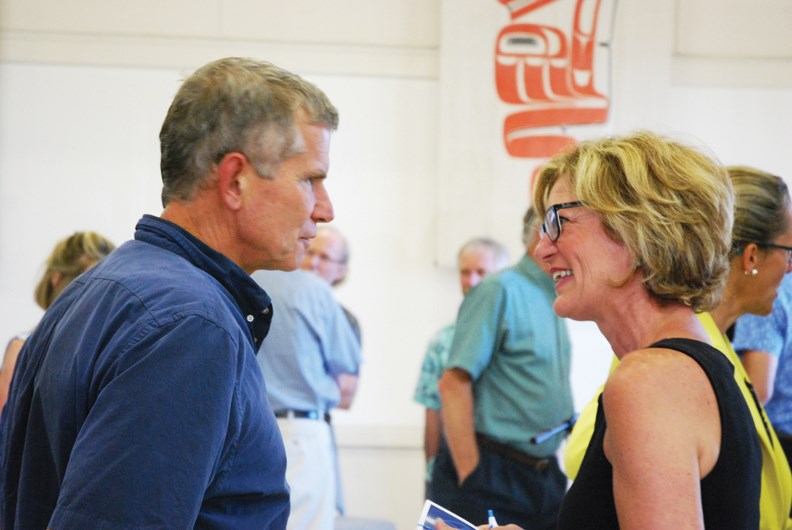West Vancouver - Sunshine Coast – Sea to Sky Country MP Pam Goldsmith-Jones was in Sechelt this week for an event billed as a “public dialogue on climate change policy and solutions.” One of the most talked about solutions was ending subsidies for fossil fuel production and increasing subsidies for green technology.
About 100 people turned up July 25 at the Sechelt Indian Band Hall for Democracy Talks: Climate Change Solutions from the Sunshine Coast.
Goldsmith-Jones told the crowd that the Liberal government in Ottawa is making action on climate change a priority. She said she sees it all the time in her role as parliamentary secretary to Minister of Foreign Affairs Stephane Dion, pointing out that climate change impacts military policy, humanitarian efforts, and foreign policy.
She also said this country can play a leading role in North America.
“Canada actually has a high percentage of green energy,” Goldsmith-Jones said, “but Canada is small, so we have to help the U.S. and particularly Mexico with our expertise, our technology and our knowledge.”
Goldsmith-Jones lined up speakers Peter Treuheit of Mobius Architecture, Matt Rockwell of the Sunshine Coast Community Solar Association, and retired University of Wisconsin professor Jim Pawley.
Treuheit and one of his partners explained the concept of “passive house” design, which they said is fast becoming the new standard. Passive houses feature better insulation, especially in the foundations, triple-glazed windows and heat recovery ventilation technology. It was the basis for a project Treuheit’s firm worked on to supply worker housing for Vancouver Coastal Health in Bella Bella.
In his update on the Community Solar Association’s work, Rockwell was among the first speakers to raise the idea of more support from the federal government. “What do we need from Ottawa?” he asked. “What we really need are financial incentives. The numbers aren’t really there for solar in B.C.”
Pawley talked about the need for Ottawa to set a proper carbon tax, set an example with its own energy consumption, and work harder to educate Canadians on climate and energy issues – something he called the TEE program.
The bulk of the two-hour event was given over to small group discussions on the themes of adaptation, technology, greenhouse gas (GHG) emission reduction, and jobs and the economy.
Representatives from each group then presented their top ideas.
When it came to GHG reduction, support for a carbon tax was one thing most groups suggested.
“Raise money by implementing a Canada-wide carbon tax and eliminating subsidies for oil and gas and animal agriculture, which are all things that dramatically impact [GHGs], and use those funds to subsidize clean, renewable energy sources,” said the designated speaker for one group.
As well as dropping subsidies to the fossil fuel industry, some groups also wanted to see more support for retraining workers in that sector for jobs in the green energy sector. One group noted that many of the skills – like pipefitting – are already transferable.
There were also calls for incentives to help consumers switch to clean energy sources, and to encourage the development of new green technologies.
Another speaker earned a round of applause by calling for the cancellation of BC Hydro’s Site C dam project.
Goldsmith-Jones said the input from the July 25 event will be included with input from similar sessions across the country to help the federal government craft a climate change action plan that will be presented at a first ministers’ meeting this fall.



